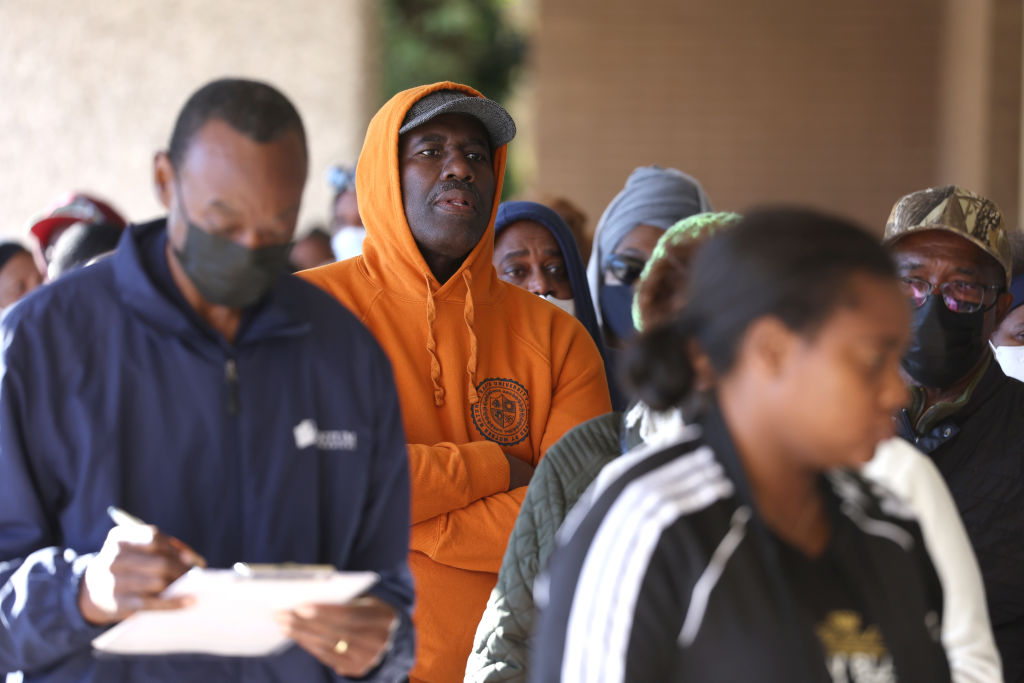Will Democrats and Republicans better engage Black men after Nov. 5?
DECATUR, GEORGIA – NOVEMBER 26: Voters line up to cast their ballots on November 26, 2022 in Decatur, Georgia. (Photo by Justin Sullivan/Getty Images)
Comedian D.L. Hughley tells theGrio it is time for Black men to “weld political power that is available to us.”
After the exhaustive and yet necessary conversations and news stories about how Black men have been taken for granted in this election cycle and the efforts to win their vote, the question remains whether both political parties will find actual solutions to better engaging Black men after Nov. 5.
TheGrio reached out to both political parties to discuss their long-term plan for Black men. Neither of the parties’ leaders have responded as they make their last-ditch campaign efforts before Election Day.
However, theGrio got the perspectives of notable leaders and figures, including comedian and the politically vocal D.L. Hughley.
“Politics is transactional,” and it is about the “specificity of the ask” for Black men to Democrats and Republicans, said Hughley.
Hughley has a special vantage point on the issue of politically engaging Black men. He attended three of several private sessions geared toward empowering Black men sessions hosted by Vice President Kamala Harris.
In September 2024, the NAACP conducted a study that found one in four Black men planned to vote for Donald Trump, challenging the Democratic Party to work harder to bring them under their umbrella.
“What we are seeing in this election is a wider margin that is driven by two areas … younger Black men under the age of 50,” Georgia gubernatorial candidate Stacey Abrams said during a podcast interview with Pastor Jamal Bryant. “There are more of them who are willing to consider voting for the Republican candidate, in part, because they have also been … the target of that party and a target of misinformation.”
Abrams noted, “Black men have been consistently high voters.” Yet their voting numbers trail that of Black women with “a two or three-point gap.”
ST. PETERSBURG, FL – NOVEMBER 2: Floridians use touch screen machines to cast their ballots November 2, 2004 in St. Petersburg, Florida. Polls indicate the race between U.S. President George W. Bush and Democratic presidential nominee U.S. Sen. John Kerry (D-MA) is too close to call. (Photo by Tim Boyles/Getty Images)
Abrams, who has studied voter trends, finds that Black men are usually “more conservative than Black women.” However, across all racial categories, men vote less than women.
After all the discussions over the politics of Black men, Hughley said it is now time to “weld political power that is available to us.”
“There is a disconnect when you are winning white women and losing young Black people,” said the syndicated radio show host, who has endorsed Harris.
Shavon Arline-Bradley, president and CEO of the National Council of Negeo Women, told theGrio that Black men and women are not on “opposite ends of the political spectrum,” adding, “Engaging Black men for both parties boils down to understanding what Black men truly value.”
She emphasized that the Black community is not “a monolith,” yet there are key areas of interest that each party must address, including: “Racism and the marginalization of Black men and families, economics, criminal justice reform, access to education and health care.”
No president has made a concerted effort to focus on the plight of young Black men since the Obama Administration. During his second term, President Barack Obama’s My Brother’s Keeper Initiative focused on minority boys and young men, with particular emphasis on African Americans.
The effort became a permanent and central part of the former president’s Obama Foundation. The non-profit organization is said to have had great success in places like Omaha, Nebraska, and Newark, New Jersey.
“We found a yearning for young Black men to feel like they were loved and that their futures matter,” said Broderick D. Johnson, former Obama White House cabinet secretary and head of the administration’s My Brother’s Keeper Initiative.
He told theGrio, “There was a role for the private sector and government to play, but there was a role for them to play in their own success.”

